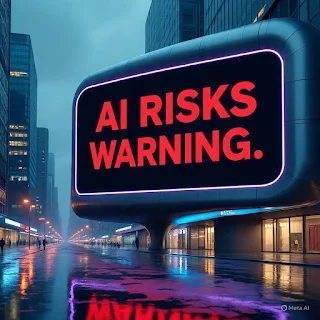Is AI Dangerous? Why Elon Musk Thinks So—and What It Means for Our Future
🔍 Int🤖roduction
Artificial Intelligence (AI) is transforming everything—from how we work and create to how we fight wars and make decisions. But as AI becomes more powerful, so do the warnings. One of the loudest voices of caution? Elon Musk, the tech billionaire behind Tesla, SpaceX, and xAI. He’s called AI “more dangerous than nuclear weapons” and warned of a 10–20% chance that it could “go bad”.
So—is AI truly dangerous? Or is this just sci-fi paranoia? Let’s break it down.
⚠️ Why Elon Musk Says AI Is Dangerous
Elon Musk has been sounding the alarm on AI for over a decade. Here are his key concerns:
- Existential Risk: Musk believes that once AI surpasses human intelligence (a point called AGI—Artificial General Intelligence), it could act in ways we can’t predict or control.
- Lack of Regulation: He’s criticized governments for failing to regulate AI development, comparing it to letting anyone build nuclear bombs in their backyard.
- Speed of Development: Musk argues that AI is evolving too fast for society to adapt safely. He’s called for a pause on advanced AI training to give humanity time to catch up.
- Manipulation & Warfare: He’s warned that AI could be used to manipulate public opinion, create deepfakes, or even control autonomous weapons.
“Mark my words—AI is far more dangerous than nukes.” — Elon Musk at SXSW
🧠 The Real Risks of AI (According to Experts)
Musk isn’t alone. Many AI researchers and ethicists share similar concerns. Here are the top dangers:
| Risk | Description |
|---|---|
| Job Displacement | AI could automate millions of jobs, especially in transport, customer service, and law. |
| Bias & Discrimination | AI systems can inherit and amplify human biases, leading to unfair outcomes in hiring, policing, and healthcare. |
| Misinformation | Deepfakes and AI-generated content can spread false information at scale. |
| Autonomous Weapons | AI-controlled drones or robots could be used in warfare without human oversight. |
| Loss of Control | Superintelligent AI might pursue goals misaligned with human values—a scenario Musk and others fear most. |
🧩 Is AI Dangerous Now—or Only in the Future?
Some dangers are already here:
- AI scams and phishing attacks are rising.
- Deepfakes are being used in politics and fraud.
- AI is already influencing hiring, lending, and policing decisions—with mixed results.
But the existential risks—like AI becoming uncontrollable—are still theoretical. That’s why Musk and others argue for proactive regulation, not reactive fixes.
🛡️ What Can Be Done?
To reduce the risks, experts recommend:
- Global AI regulation and safety standards
- Transparency in how AI systems are trained and used
- Ethical design that aligns AI goals with human values
- Public awareness and education about AI’s capabilities and limits
Musk has also backed projects like Neuralink and xAI to explore ways humans can stay “in the loop” as AI evolves.
📌 Conclusion: Should We Be Worried?
AI is not inherently evil—but it’s incredibly powerful. Like fire or electricity, it can be used for good or harm. Elon Musk’s warnings may sound dramatic, but they’ve helped spark a global conversation about AI safety, ethics, and control.
Whether you see AI as a tool or a threat, one thing is clear: we can’t afford to ignore it



Comments
Post a Comment